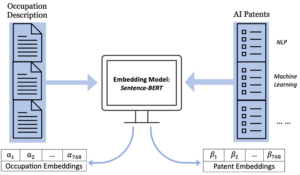A central concern regarding artificial intelligence (AI) is its potential to replace jobs and exacerbate economic inequality. However, recent research suggests that AI may improve the workers’ job prospects through a Turing Transformation process: AI simplifies work, lowers barriers to job entry, and thus broadens job opportunities for more workers. In this paper, we present a conceptual framework that decomposes the Turing Transformation into AI’s work activity and job opportunity effects. We develop a novel occupational AI exposure measure using a sentence transformer model to compare the semantic similarity between the occupation descriptions and AI patents. We find that, on average, occupations with higher AI exposure experience a decrease in the importance of a wide range of work activities, coupled with an increase in job opportunities as reflected by job posting data. This provides the first empirical evidence for the existence of the Turing Transformation process. In addition, we observe important heterogeneity in AI’s work activity and job opportunity effects across occupations with different skill requirements. These findings contribute to the literature by offering a comprehensive view of the “where,” “what,” and “how” of AI’s impact on work.
Research Paper: http://dx.doi.org/10.2139/ssrn.4515629
